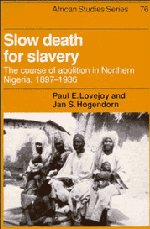Book contents
- Frontmatter
- Contents
- List of maps
- List of tables
- Preface
- 1 Slavery and the British conquest of Northern Nigeria
- 2 Fugitive slaves and the crisis in slavery policy
- 3 The debate on legal-status abolition
- 4 Emancipation and the law
- 5 Upholding proprietary rights to land
- 6 The role of taxation in the reform of slavery
- 7 The colonial economy and the slaves
- 8 The persistence of concubinage
- 9 Legal-status abolition: the final phase
- Appendix: Court records of slaves issued certificates of freedom
- Notes
- Glossary
- Bibliography
- Index
- Title in the series
7 - The colonial economy and the slaves
Published online by Cambridge University Press: 03 May 2011
- Frontmatter
- Contents
- List of maps
- List of tables
- Preface
- 1 Slavery and the British conquest of Northern Nigeria
- 2 Fugitive slaves and the crisis in slavery policy
- 3 The debate on legal-status abolition
- 4 Emancipation and the law
- 5 Upholding proprietary rights to land
- 6 The role of taxation in the reform of slavery
- 7 The colonial economy and the slaves
- 8 The persistence of concubinage
- 9 Legal-status abolition: the final phase
- Appendix: Court records of slaves issued certificates of freedom
- Notes
- Glossary
- Bibliography
- Index
- Title in the series
Summary
Lugard and many other colonial officials fervently believed that colonialism would introduce a period of unprecedented economic expansion for the emirates of Northern Nigeria, which among its other benefits would ease the transition from slavery to freedom. Slaves would be introduced into a variety of economic relationships that would so modify the institution of slavery as to promote its “natural” termination. But the ability to increase economic performance was largely dependent on the provision of better transportation, and that only came about in the second decade of colonial rule. Until the opening of the railway to Kano, the economy performed rather poorly, and the slave population suffered accordingly. Even when economic expansion was firmly underway, moreover, slaves had considerable difficulty in meeting the financial burdens imposed by colonialism, let alone in acquiring their freedom.
As we have seen, British land policies and the legal system limited the movement of slaves unless their redemption had been paid or they had obtained the permission of their masters to work on their own account. Slaves had to meet heavy financial obligations under colonialism, including the payment of taxes to the state for the first time. In addition, they were subject to fees (murgu) for the right to work independently of a master, which was often necessary to earn cash for their taxes, and if they wanted their freedom they also had to acquire the money for their ransom, either from relatives, or otherwise from their own resources.
- Type
- Chapter
- Information
- Slow Death for SlaveryThe Course of Abolition in Northern Nigeria 1897–1936, pp. 199 - 233Publisher: Cambridge University PressPrint publication year: 1993

